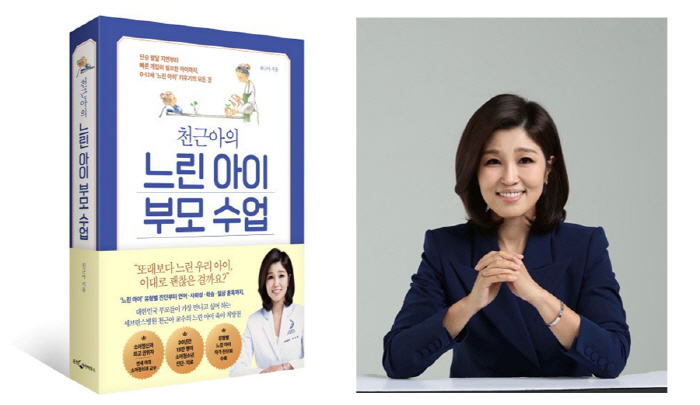Will it be okay for my child who is slower than his age...What's your advice?
Apr 03, 2025
"Even though I call my name, I don't look at it well."
Parents' minds are bound to be worried about the appearance of a child who is different from their peers. Parents feel uncomfortable when they see a child who seems to be developing somewhat late. I'm just thinking about whether I'm a little slow or if I should get treatment, but I have to wait for years before I get treatment. wait for medical treatment I look up the Internet or YouTube in frustration, but it's full of unverified degrees.
Parenting guidelines have been issued that are of practical help to these parents. Professor Chun Geun-ah of Pediatric Psychiatry at Severance Hospital published 'Chun Geun-ah's Slow Child Parent Class', which summarizes what parents raising a 'slow child' must know in one volume based on their experience in treating 150,000 children over the past 30 years.
Professor Cheon Geun-ah, the author, said, `There are many cases where information without any basis in portal, YouTube, and community information is accepted as scientifically proven knowledge.' `I hope it will be of some help to those parents who have met in the clinic and lecture hall who rely on such information but miss the time of treatment.'
Professor Cheon Geun-ah is the most trusted field of developmental disabilities in children and adolescents in Korea, and many of the published papers are cited in children and adolescent psychiatry textbooks around the world. He is currently serving as the chairman of the Korea Pediatric Youth Psychiatry Association and the director of the Korean Autism Association, and is the director of the Severance Development Center for the Developmentally Disabled and Behavioral Development Center designated by the Ministry of Health and Welfare from 2023.
From the standpoint of parents raising slow children, the most curious thing is to get an accurate diagnosis of whether our child is really a slow child. The book is full of various signals sent by slow children and objective references that can gauge the child's developmental status based on vivid and rich examples such as the call reaction that shows the child's reaction when his or her name is called.
Language is one of the things parents are most interested in during a baby's development process. Slow speaking can slow down not only communication but also cognitive development. The book advises in detail what direction a child should take for language therapy and what parents should do at home, including a guide on whether a child's late speech is a simple language delay or needs active intervention.
The book also introduces various social training methods that slow children can follow at home, such as four play methods that raise nonverbal communication related to sociality as important as language and training methods to build confidence in speaking. In addition to basic learning that is essential before school attendance, it also provides detailed advice on the principles of learning that must be observed for slower children.
From a parent's point of view, it is not easy to discipline a slow child. The book clearly tells you various disciplinary know-how necessary to discipline slow children in daily life, such as how to quickly correct problematic behavior and how to praise slow children effectively. Slow children should be treated and intervened steadily at home. Professor Cheon Geun-ah also introduces various treatment guides that can be practiced at home.
When a child is diagnosed as a slow child, the impact on parents is bound to be great. Professor Cheon Geun-ah emphasizes that a slow child is not a parent's fault. Professor Cheon Geun-ah gives warm comfort to parents of slow children who have not taken care of themselves through the book, and at the same time gives careful prescriptions to heal the hearts of siblings of slow children who are one step away from their parents' attention.
Raising a slow child is like a marathon. For every slow child and parent walking down a long and difficult path, 'Cheon Geun-ah's slow child parent class' sends a message of encouragement and support.
Parents' minds are bound to be worried about the appearance of a child who is different from their peers. Parents feel uncomfortable when they see a child who seems to be developing somewhat late. I'm just thinking about whether I'm a little slow or if I should get treatment, but I have to wait for years before I get treatment. wait for medical treatment I look up the Internet or YouTube in frustration, but it's full of unverified degrees.
Parenting guidelines have been issued that are of practical help to these parents. Professor Chun Geun-ah of Pediatric Psychiatry at Severance Hospital published 'Chun Geun-ah's Slow Child Parent Class', which summarizes what parents raising a 'slow child' must know in one volume based on their experience in treating 150,000 children over the past 30 years.
Professor Cheon Geun-ah, the author, said, `There are many cases where information without any basis in portal, YouTube, and community information is accepted as scientifically proven knowledge.' `I hope it will be of some help to those parents who have met in the clinic and lecture hall who rely on such information but miss the time of treatment.'
Professor Cheon Geun-ah is the most trusted field of developmental disabilities in children and adolescents in Korea, and many of the published papers are cited in children and adolescent psychiatry textbooks around the world. He is currently serving as the chairman of the Korea Pediatric Youth Psychiatry Association and the director of the Korean Autism Association, and is the director of the Severance Development Center for the Developmentally Disabled and Behavioral Development Center designated by the Ministry of Health and Welfare from 2023.
From the standpoint of parents raising slow children, the most curious thing is to get an accurate diagnosis of whether our child is really a slow child. The book is full of various signals sent by slow children and objective references that can gauge the child's developmental status based on vivid and rich examples such as the call reaction that shows the child's reaction when his or her name is called.
Language is one of the things parents are most interested in during a baby's development process. Slow speaking can slow down not only communication but also cognitive development. The book advises in detail what direction a child should take for language therapy and what parents should do at home, including a guide on whether a child's late speech is a simple language delay or needs active intervention.
The book also introduces various social training methods that slow children can follow at home, such as four play methods that raise nonverbal communication related to sociality as important as language and training methods to build confidence in speaking. In addition to basic learning that is essential before school attendance, it also provides detailed advice on the principles of learning that must be observed for slower children.
From a parent's point of view, it is not easy to discipline a slow child. The book clearly tells you various disciplinary know-how necessary to discipline slow children in daily life, such as how to quickly correct problematic behavior and how to praise slow children effectively. Slow children should be treated and intervened steadily at home. Professor Cheon Geun-ah also introduces various treatment guides that can be practiced at home.
When a child is diagnosed as a slow child, the impact on parents is bound to be great. Professor Cheon Geun-ah emphasizes that a slow child is not a parent's fault. Professor Cheon Geun-ah gives warm comfort to parents of slow children who have not taken care of themselves through the book, and at the same time gives careful prescriptions to heal the hearts of siblings of slow children who are one step away from their parents' attention.
Raising a slow child is like a marathon. For every slow child and parent walking down a long and difficult path, 'Cheon Geun-ah's slow child parent class' sends a message of encouragement and support.
|
This article was translated by Naver AI translator.














